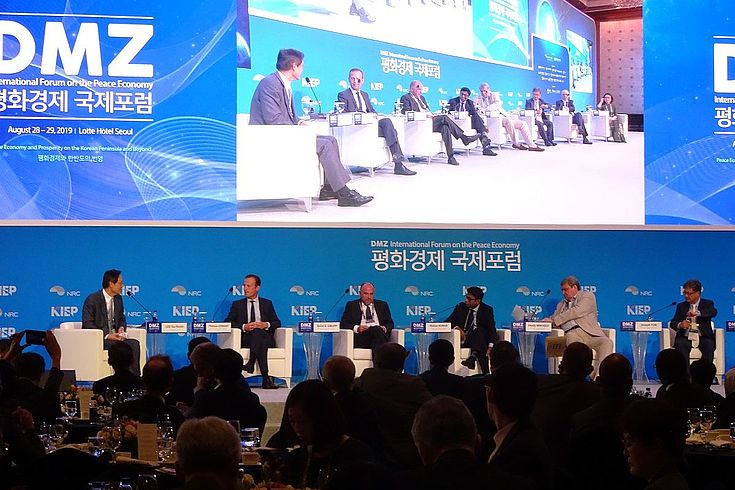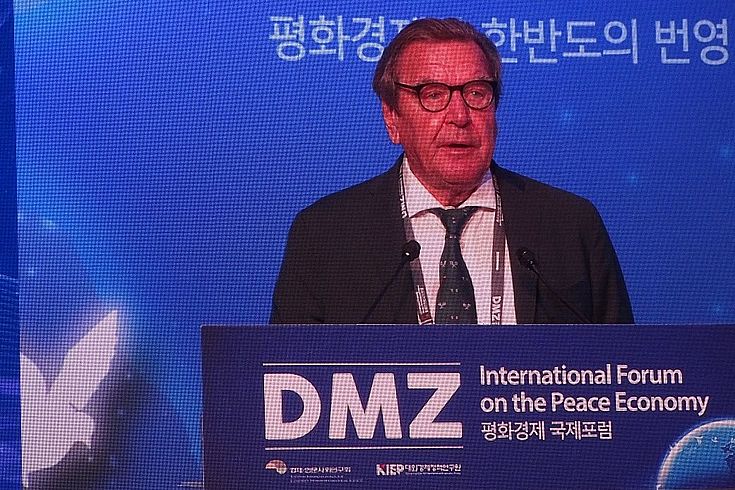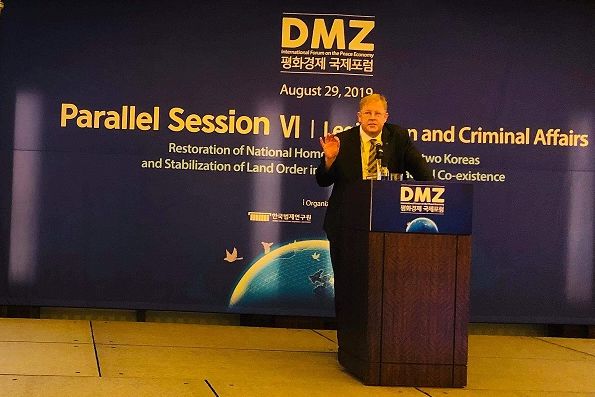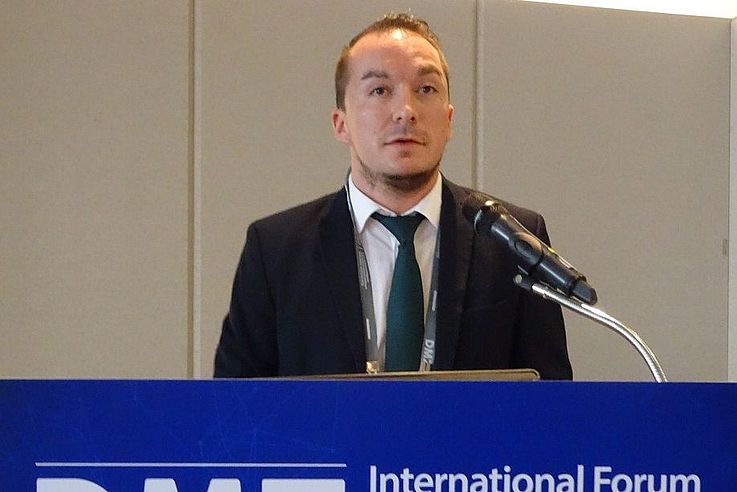Forum
In the Name of Peace and Prosperity - DMZ International Forum

Discussion with experts on the peace economy.
Since 2018 there have already been three summits between South Korean President Moon Jae-in and the North Korean leader Kim Jong-un. The historic step across the border and further intentions to commit more intensively to the peace process pointed to improved inter-Korean relations. Besides, the meetings between US President Donald Trump and Kim Jong-un have also provided confidence. It was only on 15 August that Moon Jae-in shared his visions for relations within Korea and described the process under the motto "Peace is the economy." The peace economy is of particular interest in this context, as it can be a basis for peaceful cooperation as opposed to other issues that are usually highly politicized and make dialogue impossible. Here the DMZ is of particular interest, as it symbolizes the division and the inter-Korean conflict. For about 60 years the zone has remained untouched and has developed into a unique ecosystem that is home to many species of animals and plants. The DMZ Forum has therefore set itself the goal of promoting discourse and offering national and international participants the opportunity to exchange opinions and experiences to achieve sustainable peace and prosperity on the Korean peninsula.

Former German Chancellor Gerhard Schröder shares his view on the korean peninsula.
The opening ceremony of the forum began with a short film reflecting recent events on the Korean peninsula. Mr. Seong Kyoung Ryung, Chair of the Organizing Committee for the DMZ International Forum on the Peace Economy, then welcomed the attendees and introduced the speakers, including former German Chancellor Gerhard Schröder. He referred to the historical parallels between Germany and Korea, both of which were divided as a result of the Cold War. He also emphasized his hope for a reunification of Korea, since for Germany too the "most important point in history was the abolition of division.” However, a peaceful solution would require "intensive regional cooperation" and "concrete steps by North Korea."

Dr. Bernhard Seliger presenting the German Green Belt initiative.
Afterward, the parallel sessions on various topics began. In his lecture, Dr. Bernhard Seliger, representative of HSF Korea, presented the German experiences of division and reunification under the theme "The German Green Belt - Environmental, Legal and Managerial Perspectives." He emphasized the impact of the divided zone on the German society and the ecosystem. Furthermore, he discussed the challenges that the fall of the Berlin Wall in 1989 brought for German unification. Particularly noteworthy is the "Green Belt" initiative, which began in 1989 to symbolically transform the zone, also known as the "death strip," into a monument to unification and renewal. Dr. Seliger referred to the parallels with Korea and the military demarcation line at the 38th parallel, which splits the country in North and South. After the end of the Korean War, a unique ecosystem developed in this zone, which is a retreat for many rare animals and plants. The Green Belt of Germany has had similar experiences with untouched nature and has been a symbol for nature conservation and a peaceful Germany since reunification. Based on the German lessons, Dr. Seliger derived possible future scenarios for the Korean reunification and emphasized the challenge that goes along with it.
In a parallel session, Felix Glenk, Project Manager of the DPR Korea, gave a lecture on "Conservation and International Cooperation for DMZ." He presented the work of HSF in North Korea, which focuses on environmental projects and nature conservation. He emphasized the challenge of peace and dialogue promotion in the DPRK, as "the border is probably the most difficult issue." On the other hand, the HSF has had very good experiences with its North Korean partners in dialogue and exchange in nature conservation projects, as many common goals and interests can be found on this topic, thus creating a more significant foundation of trust. This offers the opportunity to integrate North Korea globally and to bring it into multilateral cooperation.
The following day, Felix Glenk gave an interview to the morning radio show "Good Morning Seoul" on Arirang. There he shared his impressions about the DMZ International Forum and stated that "the multitude of topics addressed" was a positive sign that the complicated situation on the Korean peninsula was to be addressed in its entirety. Besides, he stressed that the Forum had been an ideal opportunity for international and national participants to discuss how to create new platforms for dialogue and communication in North Korea.

